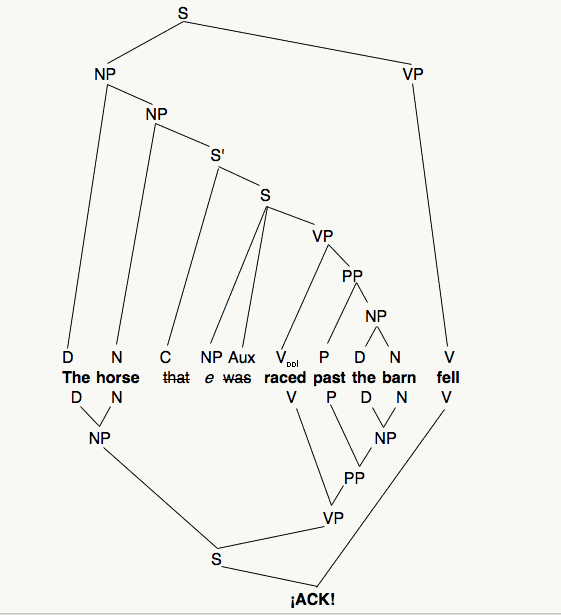Nature's dominoes
« previous post | next post »
My colleague Tom Bever felt he had really hit the big time today when he learned that one of his example sentences had made it into the funny pages. Admittedly, it was in the linguistically hypersophisticated Dinosaur Comics (as usual, click on the image to see it full-size):
For a brief introduction to the example, try the Wikipedia article on garden-path sentences1, or for a rather more thorough discussion, Chapter 1, section 4.2 of this on-line introductory neuropsychology coursebook, in which Tom is referred to as 'a famous psycholinguist'. [Aside to Tom: It's true! Big time! Quick, ask for a raise — my finder's fee is a mere 10%.]
Because I'd rather draw trees than grade papers, here's two trees (done in a kind of Simpler Syntax/Syntactic Structures style, just because it's, well, simpler) illustrating the correct and garden-pathed parses of the sentence.

I actually prefer an analysis where raced past the barn is an adjective phrase headed by an adjectival participle, although I represented it as a reduced relative with elided that and was in honor of the usual term for the construction. English has a constraint against prenominal adjective phrases that would account for the postnominal order (compare the similar book/*the book similar vs. the book similar to Don Quixote/*the similar to Don Quixote book). Me, I'm not scared of bracketing paradoxes. But never mind.
I do really love drawing trees. Someday if you're good I'll show you the Buffalo buffalo tree.
1The Wikipedia article says that the idiom from which the name of the garden path phenomenon is drawn is "to be led down the garden path". I always thought you were led up the garden path. Google's on my side, 1070 to 1920, though just barely; combined the expression gets fewer hits than, e.g., "screw the pooch". This is why my undergraduates don't understand me.

Kris Rhodes said,
May 18, 2008 @ 2:24 am
Contrary to Orange Dinosaur's intuition, the sentence in question could be said naturally given the right circumstances.
"There were two horses, right? And we were racing them around, testing their endurance. We raced one horce through the corral and back, the other we raced past the barn and back. So I can't remember their names, but one we raced past the barn, and one through the corral, right? And anyway, my point is, the horse raced past the barn fell. The other horse never did fall, but the one raced past the barn did. Poor horse."
Something like that.
-Kris
Jim Kingdon said,
May 18, 2008 @ 4:07 am
Well, no doubt I've read too much Tolkien, but I parsed "the barn fell" as a noun phrase (where "fell" means evil, or I suppose in the case of a barn, something closer to haunted, and putting the adjective after the noun is the usage which you occasionally see in poetry or the like), and I guess once I say that, the rest of "the horse raced past the barn fell" falls into place.
LeNi said,
May 18, 2008 @ 6:48 am
I thought when reading the sentence first that the horse was running past the hill with the barn on it. Fell running = hill running, for example.
Alex Wood said,
May 18, 2008 @ 7:44 am
I again took "barn fell" as an NP, using "fell" in the sense of a rocky ridge.
Painini said,
May 18, 2008 @ 7:27 pm
Thank you, Kris Rhodes. That example may actually stop my wanting to throw a semicolon in that sentence and be done with it. (The horse raced past; the barn fell. It … was an impressive horse.)
Sili said,
May 18, 2008 @ 8:00 pm
For those who don't know that Dinosaur Comics have an extra joke hidden in the mouseover text let me just quote it here: "they're just standing around then WHOOPS".
This is one of my all time favourites.
Lane said,
May 19, 2008 @ 9:17 am
Do post the Buffalo buffalo buffalo Buffalo buffalo tree – I always try to explain this to people in person and make a hash of it. I think I need to send them a written explanation.
Rubrick said,
May 19, 2008 @ 2:36 pm
Likewise on the buffalo tree. Also, "Buffalo Tree" is an excellent title for a post by any criteria.
dr pepper said,
May 19, 2008 @ 3:43 pm
"Buffalo Tree" would be a great name for a new wave band.
LS said,
May 20, 2008 @ 6:36 pm
I also would like to see the buffalo tree – one old prof asserted that you could keep adding buffalos forever but I can't really wrap my head around more than five (or maybe as many as seven if "buffalo buffalo buffalo" is an NP along the lines of "man's men men")
LS said,
May 20, 2008 @ 6:41 pm
Ah! It turns out that the Wikipedia entry is very good:
http://en.wikipedia.org/wiki/Buffalo_buffalo_Buffalo_buffalo_buffalo_buffalo_Buffalo_buffalo
Ran Ari-Gur said,
May 21, 2008 @ 9:48 pm
I'm neutral toward "reduced relative" analyses, but I think they do explain, at least, the difference between "It's a difficult book to read" and "It's a book difficult to read."
Roger Lustig said,
June 21, 2008 @ 10:28 am
5 weeks later the NYT comes through with a fine double garden-path headline:
COMPANY HIRED
TO TEST CONCRETE
FACES SCRUTINY
Thanks to my sister-in-law the first-grade teacher for spotting the "faces" twist: seeming plural direct object is revealed as 3rd-person-singular verb.
Is this a novelty?